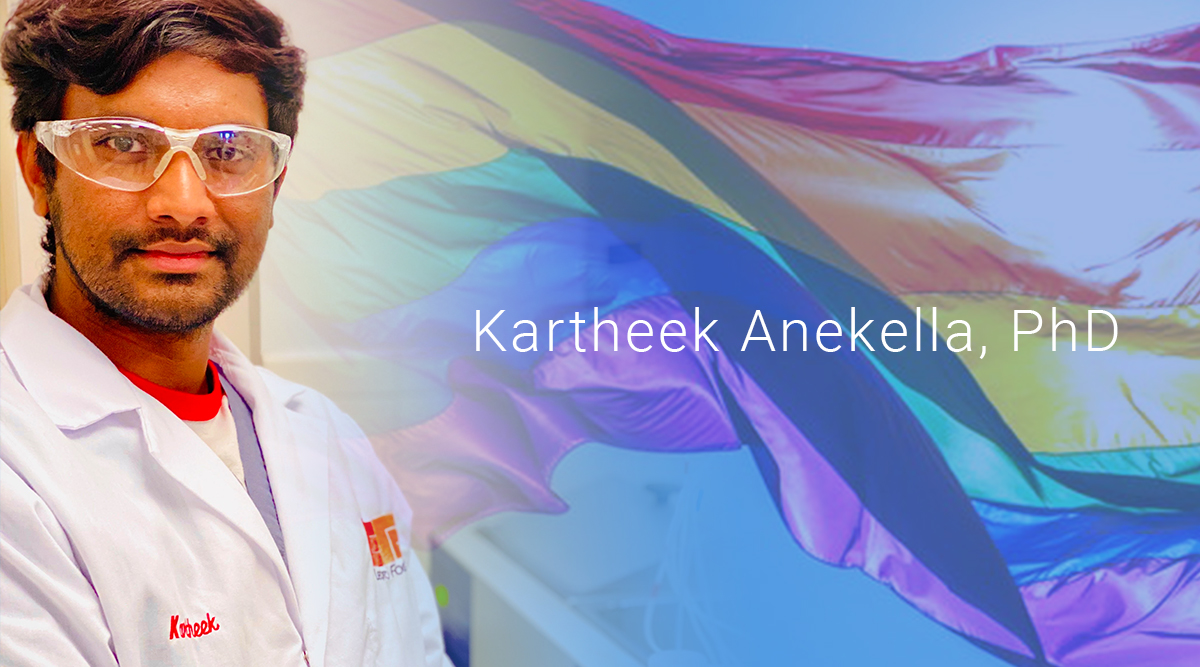
Pride Month Reinforces the Importance of Respect for Others
IFT member Kartheek Anekella, PhD, shares his perspectives on the meaning behind Pride Month, the importance of respect, and the supportive community he’s found within IFT.

This month marks the 50th anniversary of the first Pride march in New York City. What started as a commemoration of the 1969 Stonewall Uprising has grown to encompass a month-long series of events around the world, bringing millions together to celebrate the LGBTQ+ community.
However, Pride Month 2020 looks different than years past. The COVID-19 pandemic has forced many cancellations, including hundreds of Pride marches, parades, festivals, and events. While this disappoints many people, the meaning behind these events is what’s really important, according to IFT member Kartheek Anekella, PhD.
“I have attended Pride festivals in various cities in North America and really enjoy them,” Kartheek, a technical sales specialist at Leprino Foods, said. “It is not just about having fun, but also remembering the history and tradition and how we got here as a community after years of oppression. I feel lucky to be in this country where I can be myself and be respected without hiding.”
Kartheek grew up in India and became interested in food science during his undergrad at Vellore Institute of Technology in Tamil Nadu, India. He had some friends pursue higher education in the field and decided to do the same. He moved to Montréal in Québec, Canada, to pursue a master’s degree in bioresource engineering at McGill University and continued on to earn his PhD from North Carolina State University. It wasn’t until he began working full-time that he felt comfortable openly sharing who he was with the world.
“Growing up in India, I thought I needed to hide who I was because it is an extremely conservative and traditional society. But deep down, I felt like I was not being authentic which certainly affected my day-to-day life,” Kartheek said. “I am thankful to have a supportive network of friends and colleagues who respect and value me for who I am.”
For Kartheek, one of those supportive networks is IFT. He shared that he wouldn’t be where he is today professionally without the various opportunities IFT has provided him, including scholarships and career advice when he was still in school and participation in divisions and award juries now that he is working in industry. He also thinks IFT is moving in the right direction from a diversity, equity, and inclusion (DEI) standpoint.
“IFT is a living embodiment of DEI through its members and global presence,” Kartheek said. “The LGBTQ+ reception at IFT19 is just one example that speaks volumes to IFT's commitment to promoting DEI within the food industry in the US and globally.”
“Respect to me means treating everyone equally regardless of their ability, age, ethnicity, gender, race, or sexual orientation. It is easier said than done since we are all human and our preconceived notions can sometimes affect our judgement about other people, but it’s so very important,” Kartheek said. “I have a great respect for people who are authentic, who can stand up for themselves, and who encourage others to be themselves. I am thankful to have managers and coworkers at my workplace who reciprocate this respect toward me.”
Like many of his peers, Kartheek is extremely passionate about the science of food. As an application scientist, he enjoys creating new foods and being able to eat the result of his work. He also enjoys explaining the basic science with his non-food science friends and keeping up with ever-evolving industry trends. Perhaps more than anything, he appreciates that food brings people together.
“Food science is a diverse science not just from a technical standpoint, but also from a people standpoint,” Kartheek said. “We have professionals all over the globe who collaborate beyond borders and it is crucial that we treat each other with respect. We are a global community and it is time we embrace the diversity people bring to the table.”
Kartheek acknowledges that the path is different for everyone, but encourages food scientists, especially those in the LGBTQ+ community, to stand in solidarity and respect one another.
“We all come from various backgrounds, beliefs, and upbringing. Take your time to figure out who you are as a person,” Kartheek said. “Bringing your authentic self to work is important but unfortunately not all professionals have that freedom depending on where you are located. Surround yourself with people of similar interests and allies who support you. Your mental health and well-being matter—and our community is always there for you.”
